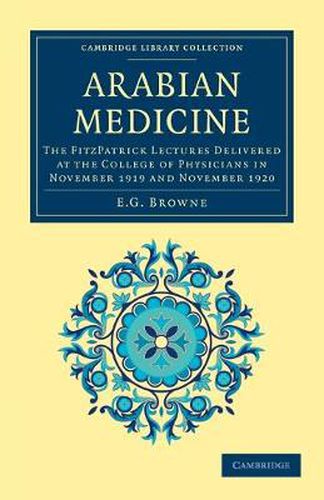Readings Newsletter
Become a Readings Member to make your shopping experience even easier.
Sign in or sign up for free!
You’re not far away from qualifying for FREE standard shipping within Australia
You’ve qualified for FREE standard shipping within Australia
The cart is loading…






E. G. Browne (1862-1926), who combined outstanding skills in medicine and Arabic and Persian studies, has left an indelible mark in his fields of expertise. He first learned Turkish in his teens, and went on to study all the languages of the Islamic tradition, while also qualifying as a physician. This collection of four FitzPatrick Lectures, delivered at the Royal College of Physicians in 1919-20, and first published in 1921, covers subjects such as Arabic as a scientific language, the transmission of Greek learning, and important Islamic medieval writers. Brown describes the role of Islamic physicians in transmitting Greek and Roman medical science through the Dark Ages, both preserving and building upon texts which were lost or misunderstood in the West. He further argues that the scientific elements of Islamic literature should be seen as complementing and supporting the imaginative and aesthetic works of literature, history and poetry.
$9.00 standard shipping within Australia
FREE standard shipping within Australia for orders over $100.00
Express & International shipping calculated at checkout
E. G. Browne (1862-1926), who combined outstanding skills in medicine and Arabic and Persian studies, has left an indelible mark in his fields of expertise. He first learned Turkish in his teens, and went on to study all the languages of the Islamic tradition, while also qualifying as a physician. This collection of four FitzPatrick Lectures, delivered at the Royal College of Physicians in 1919-20, and first published in 1921, covers subjects such as Arabic as a scientific language, the transmission of Greek learning, and important Islamic medieval writers. Brown describes the role of Islamic physicians in transmitting Greek and Roman medical science through the Dark Ages, both preserving and building upon texts which were lost or misunderstood in the West. He further argues that the scientific elements of Islamic literature should be seen as complementing and supporting the imaginative and aesthetic works of literature, history and poetry.